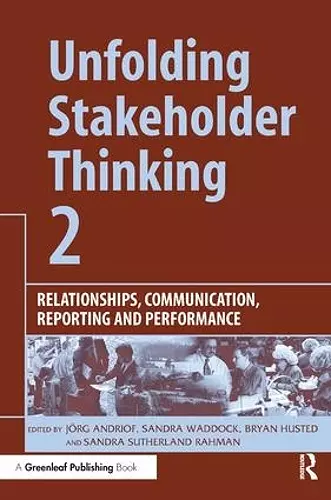Unfolding Stakeholder Thinking 2
Relationships, Communication, Reporting and Performance
Sandra Waddock author Bryan Husted author Sandra Sutherland Rahman author Jörg Andriof author Sandra Waddock editor Bryan Husted editor Sandra Sutherland Rahman editor Jörg Andriof editor
Format:Hardback
Publisher:Taylor & Francis Ltd
Published:1st Apr '03
Should be back in stock very soon

Collects a series of essays by leading researchers worldwide to focus on the practice of stakeholder engagement in terms of relationship management, communication, reporting and performance. "If you wish to keep pace with the developments of thought reflecting this core area of your practice, this book and its companion are a great place to start." Ethical Corporation
As stakeholder relationships and business in society have become increasingly central to the unfolding of stakeholder thinking, important new topics have begun to take centre stage in both the worlds of practice and academia. The essays in this book focus on the practice of stakeholder engagement.
This book is the companion to "Unfolding Stakeholder Thinking: Theory, Responsibility and Engagement", which examined many emerging theoretical and normative issues and was released to acclaim in October 2002. "Unfolding Stakeholder Thinking 2" collects a series of essays by leading researchers worldwide to focus on the practice of stakeholder engagement in terms of relationship management, communication, reporting and performance.
As stakeholder relationships and business in society have become increasingly central to the unfolding of stakeholder thinking, important new topics have begun to take centre stage in both the worlds of practice and academia.
The first part of the book makes clear that simply engaging with stakeholders is insufficient to build successful stakeholder strategies. Companies, considered as the focal entity in a relationship, also need to actively communicate with stakeholders and manage their relationships. Dialogue is essential but can only be useful if companies listen to the messages that stakeholders are sending them. It is also essential to understand the role of power and influence in stakeholder engagement strategies especially if partnerships or collaborations emerge from the relationships that are engendered. The book examines a wide range of corporate–NGO collaborations to determine what makes them effective – and what makes them fail. Conflict management in stakeholder alliances is also discussed.
The second part of the book addresses the critically important element of emerging schemes for the assessment, measurement and reporting of business in society and relationships involving stakeholders. A variety of current approaches to stakeholder assessment and reporting are discussed here including social auditing and sustainability reporting.
The evolution of stakeholder thinking has led to a new view of the firm as an organism embedded in a complex web of relationships with other organisms. The role of management becomes immensely more challenging, when stakeholders are no longer seen as simply the objects of managerial action but rather as subjects with their own objectives and purposes. This book captures the complexity of managing relationships with stakeholders and will provide both practitioners and researchers with a wealth of information on the benefits and consequences of this practice.
The range of the ideas presented, along with the extensive, up-to-date bibliography, provide an accessible road into this increasingly important field. - Natural Resources Forum, November 2003
Lots on tools for assessment, measurement, social auditing and reporting. A book that every CSR manager should make themselves read. - Corporate Citizenship Briefing, July 2003
... undoubtedly a worthwhile collection ... - Social and Environmental Accounting Journal, September 2004
ISBN: 9781874719533
Dimensions: unknown
Weight: 640g
296 pages